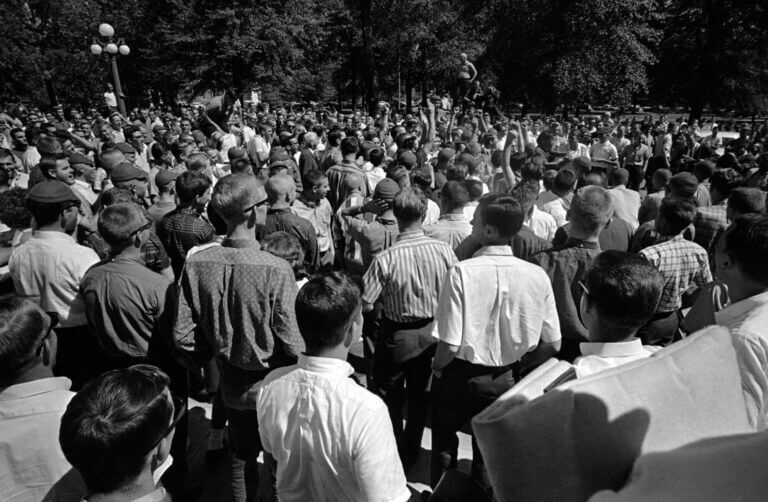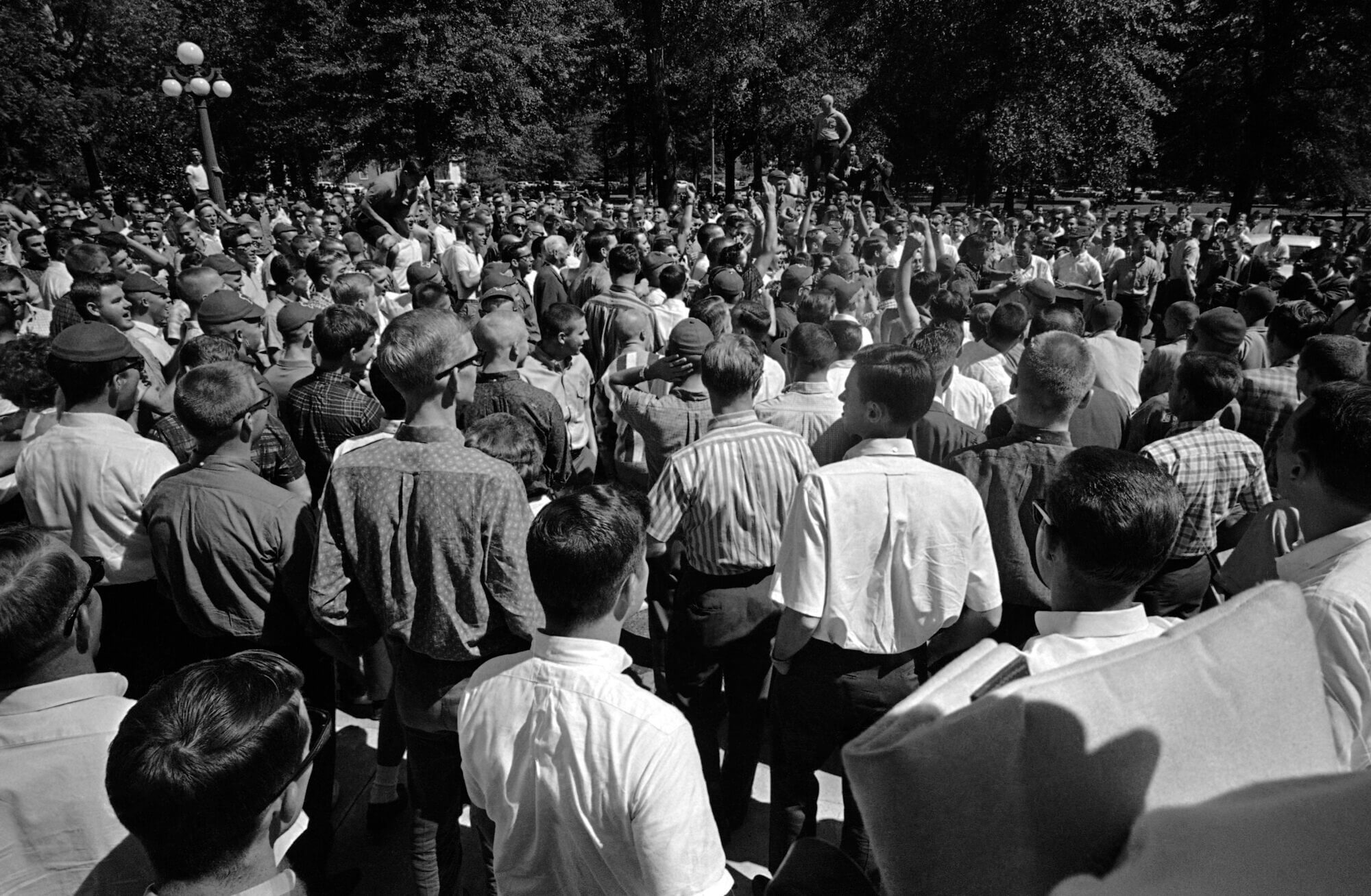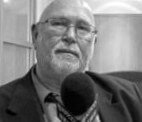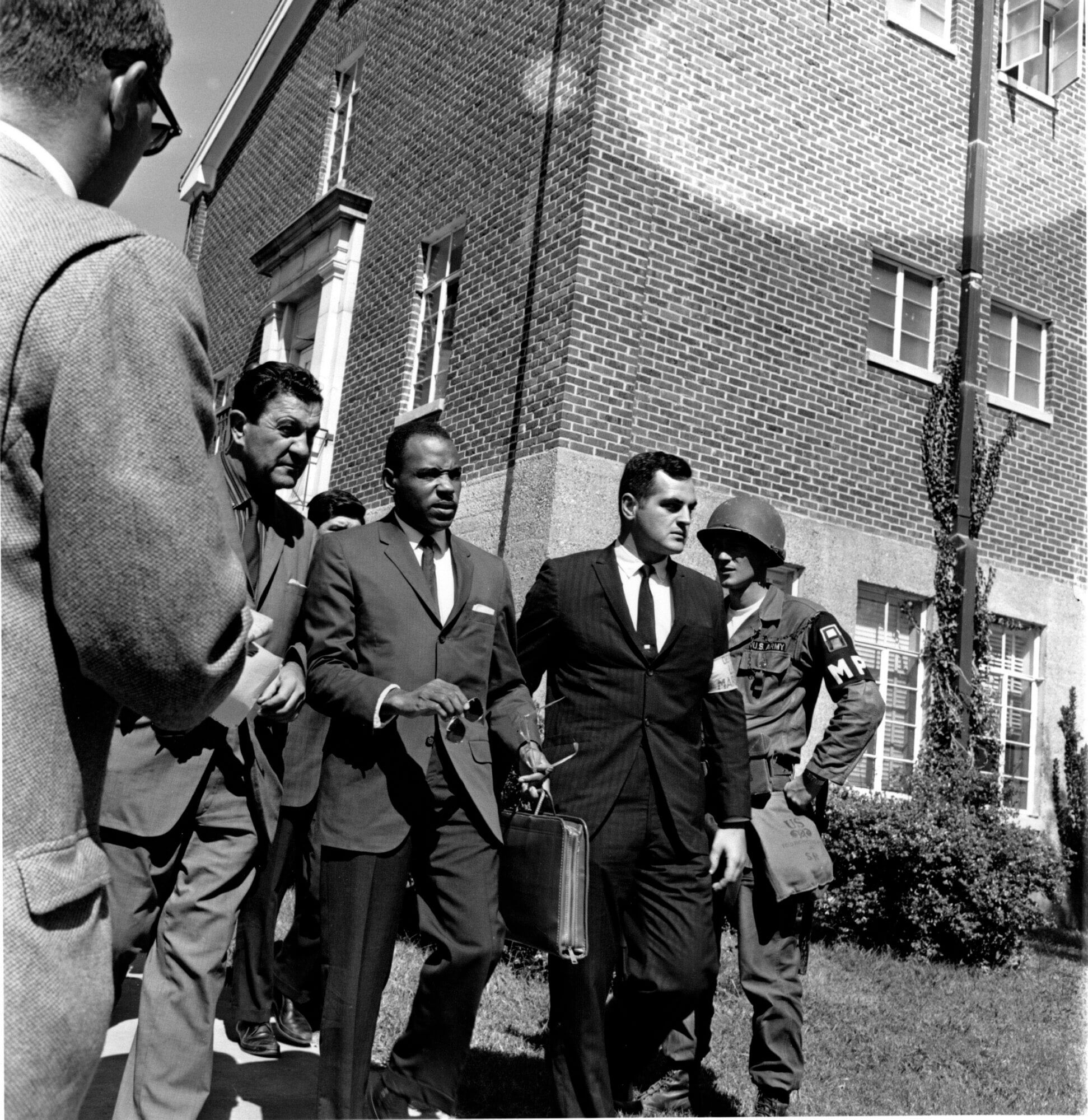

Editor’s note: This essay is part of Mississippi Today Ideas, a platform for thoughtful Mississippians to share fact-based ideas about our state’s past, present and future. You can read more about the section here.
The Trump administration’s obsession with sending National Guard troops hither and yon brings back memories of the time I spent as a member of a mobilized Guard unit.
It was 63 years ago on Sept. 30, and yes, it did coincide with the admission of James Meredith as the first Black student at the University of Mississippi. I was a senior journalism student at Ole Miss and a part-time reporter for The Oxford Eagle. I also had another part-time job as a member of the Mississippi National Guard, one I had held since high school.
All three came together in the last week of September 1962. I covered Lt. Gov. Paul Johnson, who was in Oxford to deny Meredith’s enrollment because Gov. Ross Barnett’s flight was fogged in at Jackson and could not be there himself to turn Meredith away. Things got even more interesting that weekend.
On Saturday, Sept. 29, Gov. Barnett called up the National Guard to go to Oxford to stop the U.S. Justice Department from enrolling Meredith on Oct. 1. A contingent of federal officials, including U.S. marshals and Department of Justice officials, had flown in from Memphis with Meredith and placed him in a highly guarded dormitory.

My unit, B Troop of the 108th Armored Cavalry Regiment was based in Pontotoc, 30 miles from the university. After a night and the next day rounding up troops, we were ready to go. We soon heard, however, that we had a new boss. President John F. Kennedy had federalized the Mississippi National Guard, taking away Barnett’s biggest club.
We heard that a crowd was gathering on campus. There had been an Ole Miss football game in Jackson the night before, where Barnett had vowed to keep Meredith out of Ole Miss. Students returning to campus found a phalanx of U.S. marshals and other assorted federal officers surrounding the Lyceum, the administration building. Students and outsiders, egged on by former Gen. Edwin Walker, soon were throwing bottles, rocks and Molotov cocktails at state Highway Patrol officers, U.S. marshals, other law enforcement officers and the contingent of the news media that had gathered.
The federal security was not large, and defenses became even weaker when the state Highway Patrol pulled away from the lines and refused to help the Feds.
It was soon obvious that things were out of hand. National Guard Troop E of the 108th Armored Cavalry Regiment in Oxford was the first unit onto the campus. Capt. Murry Falkner, nephew of novelist William Faulkner, was the commander. Falkner was hit by a chunk of concrete, sustaining a broken arm, but led his troops into the fray. Troop E only had 67 soldiers. Soon, the Water Valley National Guard was brought in.
Pontotoc’s Troop B was next, and we loaded into our jeeps and troop trucks and headed west on U.S. Highway 6 to Oxford. On the 40-minute drive we were constantly being passed by cars heading to the same place as we were, but not for the same reason. Most did not know that Kennedy had taken the Guard away from Barnett and were shouting “let’s go get him,” (not the exact quotes).
By the time we got on University Drive heading onto the campus, it was obvious things were going to be rough. As we went into the circle around the Grove, where the rioters were massed, we saw cars burned. One belonged to my professor Samuel Talbert, chair of the Journalism Department. We did not have time to think about what we were seeing.

Suddenly, someone threw a Molotov cocktail firebomb from the Grove, striking the tailgate of our troop truck and fortunately falling back on the street and not torching us. Rocks and bottles pelted the side of our truck. Every obscenity known to man and newly concocted ones were yelled at us.
We finally got in front of the Lyceum, jumped from our vehicles and began taking positions. We shined the lights of the vehicles into the Grove where the rioters were congregated, hoping that would help us spot trouble better.
We found out the next morning that might not have been our best move. One of our officers, Lt. John Fox, and I stood behind a jeep for a while observing the turmoil. The next morning Lt. Fox told me to look at the front of the jeep. I did and saw bullet holes in the windshield, around the headlights and on other parts of the jeep.
The rioters were not happy with the headlights and were trying to shoot them out. Fortunately, they did not hit us as we took shelter behind the vehicles.
The situation got worse after midnight when the word passed down the line that the U.S. marshals were running out of tear gas. That rather obnoxious gas was what was keeping the mob at bay. As the marshals fired their canisters fewer apart, the rioters moved close and closer to our lines in front of the Lyceum.
Things were becoming dangerously catastrophic. We had weapons and ammunition but not enough for the situation. We were attentive when we heard a “tromp, tromp, tromp” coming down toward the football stadium. Soon a line of soldiers from 503rd Military Police Battalion Airborne at Fort Bragg, wearing riot gear and carrying rifles with bayonets, marched up the street and took up positions. Kennedy had sent in the trained regular Army riot dispersers.
I will never forget the gravelly-voiced sergeant who ordered his troops to “Right face,” so they would be facing the Grove. Then he said, “Fix bayonets!” Then he said, “Lock and load, one round.” The metallic ring of the bayonets and the click of the rifles being loaded obviously made an impact. Rioters were already running away before the sergeant ordered his troops into riot formation and they fanned out across the Grove.
The real danger was over but there were skirmishes the next morning with Guardsmen and the MPs chasing scattered bands of dispersed rioters and troublemakers around the university campus and the city of Oxford.
Two people were killed in the riot, many injured and there was looting, destruction of property and hijacking of cars. Besides the students who took part in the rioting, there were outsiders who came in from around the state and from surrounding states to preserve their sacred institution of segregation.
One Mississippi television station even encouraged people to go to Oxford to stop Meredith from enrolling. Gov. Barnett did not discourage anyone from going.
Why rehash “The Oxford Incident” as the Feds called it, or “Operation Rocky Road” as the Mississippi National Guard termed it?
It might be worth considering the circumstances as President Donald Trump seems intent on using the National Guard for his endeavors. Let us consider the situations in Los Angeles and Washington. No signs of rioting, people being killed by rioters, no looting, no extensive burning or property destruction. I did not see two Guard members standing behind a jeep for safety and finding bullet holes in it the next day.
In D.C., I saw Guard troops standing around national monuments, chatting with tourists and having their pictures taken with them. I saw Guard personnel stationed in front of federal buildings in Los Angeles with little activity around.
After college, as a reporter for United Press International, I covered a few other disturbances that involved the use of National Guard troops. There was always credible evidence for their use.
There seem to be more plans for such far-fetched actions. Trump is trying now to send the Guard to other cities, like Chicago and Portland. He seems to have a gleam in his eye for New York City.
We have heard claims that there is serious trouble in all those cities, but the Trump minions have not brought any evidence to contradict relative scenes of peace.
Force was needed at Ole Miss. There was rioting, looting, killing, property destruction and defiance of federal court orders. Force used to quell dangerous and catastrophic situations can be necessary.
Force used for personal whim and for personal political advantage without cause are a travesty against our democracy and Constitution. The Trump administration opts for the latter.
Bio: Terry Wooten is a native of Pontotoc who studied journalism at the University of Mississippi. He worked as a reporter for the then-Tupelo Daily Journal and United Press International in Jackson and Charlotte, N.C. At UPI, he covered the race story in Mississippi and North Carolina. He was also a foreign correspondent and news executive in London and Europe for Futures World News for seven years and was managing editor/commodities for Dow Jones Newswires in New York.
- Former Greenwood police officer pleads guilty to federal drug trafficking charges - February 27, 2026
- UMMC officials say normal operations will resume Monday after cyberattack - February 27, 2026
- Hinds County public defender: Office needs additional funding to avert constitutional crisis - February 27, 2026